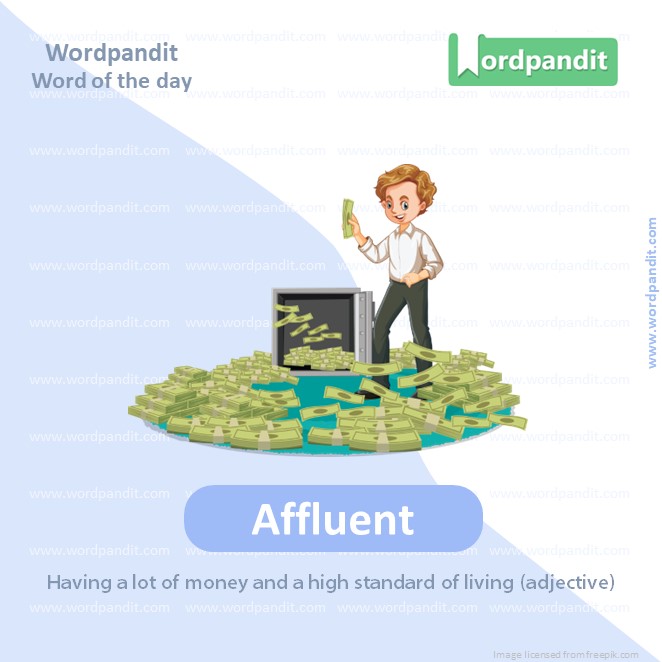Daily Vocabulary Words: List of Daily Used Words in Leading International Newspapers
Hi there. Welcome to this special section @ Wordpandit.
Our endeavour here is very simple: to highlight important daily vocabulary words, which you would come across in leading newspapers in the country. We have included the following newspapers in our selection:
• The New York Times
• The Washington Post
• Scientific American
• BBC
• The Guardian
• Psychology Today
• Wall Street Journal
• The Economist
We are putting in extensive work for developing your vocabulary. All you have got to do is be regular with this section and check out this post on a daily basis. This is your repository of words that are commonly used and essentially, we are posting a list of daily used words. Hence, this has significant practical application as it teaches you words that are used commonly in leading publications mentioned above.
Visit the website daily to learn words from leading international newspapers.
WORD-1: Wagging
CONTEXT: They don’t want to feel like a schoolmarm wagging their finger at how people live their lives.
SOURCE: New York Times
EXPLANATORY PARAGRAPH: Wagging is like when a dog is happy, and its tail moves from side to side. It’s a playful movement that shows excitement or joy. So, when someone talks about wagging, they might be referring to the happy movement of a dog’s tail or something else swinging from side to side cheerfully.
MEANING: Moving briskly from side to side, especially in a cheerful or playful manner. (verb)
PRONUNCIATION: wag-ing
SYNONYMS: swinging, swaying, fluttering, oscillating, shaking
USAGE EXAMPLES:
1. The dog expressed its happiness by wagging its tail vigorously.
2. The children were wagging their fingers in excitement as they played in the park.
3. The colorful flag was wagging in the breeze on top of the hill.
4. The baby’s mobile had toys that were constantly wagging, capturing the infant’s attention.
WORD-2: Extolling
CONTEXT: the value of marriage as an institution but who stop short of extolling “the ideal of the two-parent family.”
SOURCE: New York Times
EXPLANATORY PARAGRAPH: Extolling is like praising something or someone very loudly and happily. It’s like saying, “Wow, you’re amazing!” or “This cake is the best ever!” It’s expressing admiration and appreciation with lots of enthusiasm.
MEANING: Praising or lauding someone or something enthusiastically. (verb)
PRONUNCIATION: ex-toh-ling
SYNONYMS: applauding, acclaiming, glorifying, celebrating, commending
USAGE EXAMPLES:
1. The coach was extolling the team’s hard work and dedication after their victory.
2. The teacher spent the class extolling the creativity and effort put into the students’ art projects.
3. The critic wrote a glowing review, extolling the performances of the actors in the play.
4. The proud parent couldn’t stop extolling their child’s achievements at the school assembly.
WORD-3: Sclerosing
CONTEXT: In very rare cases, many years after an initial infection, measles can even lead to an incurable degenerative neurological disorder called subacute sclerosing panencephalitis, which can produce sudden loss of language and balance, typically in adolescents who got sick with measles but recovered as young children, and will almost always eventually lead to coma and death.
SOURCE: New York Times
EXPLANATORY PARAGRAPH: The term “sclerosis” often relates to hardening or thickening of tissues. So, when someone talks about “sclerosing,” they might be referring to a medical process where tissues become abnormally thickened or hardened.
MEANING: The process of hardening or thickening of tissues, especially due to a medical condition. (verb/noun)
PRONUNCIATION: skler-oh-sing
SYNONYMS: hardening, solidifying, thickening, induration
USAGE EXAMPLES:
1. The doctor explained the sclerosing of the arteries, emphasizing the importance of a healthy lifestyle.
2. The medical researcher studied the sclerosing process in patients with a specific condition.
3. The diagnostic test revealed signs of tissue sclerosing in the affected area.
4. The patient underwent treatment to slow down the sclerosing of the joint tissues.

WORD-4: Implausible
CONTEXT: This is the kind of spike — a 3,000 percent increase — that looks implausible in headlines.
SOURCE: New York Times
EXPLANATORY PARAGRAPH: Implausible is like when someone tells you a story that sounds a bit too unbelievable or like a fairy tale. It means something is hard to believe because it seems unlikely or doesn’t make much sense.
MEANING: Not seeming reasonable or probable; failing to convince (adjective).
PRONUNCIATION: im-plaw-zuh-buhl
SYNONYMS: unbelievable, improbable, far-fetched, incredible, unlikely
USAGE EXAMPLES:
1. The detective found the suspect’s alibi implausible and decided to investigate further.
2. The plot twist in the movie was so implausible that it left the audience in disbelief.
3. His explanation for being late seemed implausible, raising suspicions among his colleagues.
4. The scientist deemed the experimental results implausible and conducted additional tests.
WORD-5: Expedited
CONTEXT: the compromise would provide the resources for a vastly expedited asylum process, one designed to reach final decisions in six months, as opposed to the yearslong process that exists today.
SOURCE: New York Times
EXPLANATORY PARAGRAPH: Expedited is like getting your pizza delivered super fast because you’re really hungry. It means making something happen quickly or getting it done faster than usual, like rushing to finish your homework so you can go out and play.
MEANING: Accelerated or done with greater speed; completed or accomplished quickly. (verb/adjective)
PRONUNCIATION: ek-spi-dahy-tid
SYNONYMS: hastened, accelerated, quickened, fast-tracked, rushed
USAGE EXAMPLES:
1. The company expedited the shipping process to ensure customers received their orders on time.
2. The urgent request was expedited to address the customer’s immediate needs.
3. The construction project was expedited to meet the tight deadline set by the client.
4. The manager expedited the approval process to facilitate the timely launch of the new product.

WORD-6: Affluent
CONTEXT: the term as “ideas and opinions that confer status on the affluent while often inflicting costs on the lower classes.
SOURCE: New York Times
EXPLANATORY PARAGRAPH: Affluent is like having lots of toys, candies, and everything you need. It means being rich or having a lot of money and resources. So, when someone talks about an affluent neighborhood, they’re describing an area where people have plenty of nice things.
MEANING: Having a lot of money and a high standard of living (adjective).
PRONUNCIATION: af-loo-uhnt
SYNONYMS: wealthy, prosperous, rich, opulent, well-off
USAGE EXAMPLES:
1. The affluent businessman donated a large sum of money to the local charity.
2. The city’s affluent district was known for its luxurious houses and upscale shops.
3. The affluent family enjoyed vacations in exotic locations and attended exclusive events.
4. The entrepreneur’s investments made him increasingly affluent over the years.

WORD-7: Confrontation
CONTEXT: they could tip into a direct confrontation between state and federal authority of a kind not seen since the Civil War.
SOURCE: New York Times
EXPLANATORY PARAGRAPH: Confrontation is like when two friends disagree about which game to play and have a little argument. It means a face-to-face disagreement or conflict where people express their differences of opinion or feelings directly.
MEANING: Face-to-face meetings or conflicts between opposing individuals or groups (noun).
PRONUNCIATION: kun-fruhn-tey-shuhn
SYNONYMS: conflict, clash, confrontation, disagreement, altercation
USAGE EXAMPLES:
1. The heated confrontation between the neighbors was resolved through open communication.
2. The political debate turned into a confrontation as candidates passionately defended their views.
3. The supervisor intervened to prevent a physical confrontation between the employees.
4. The diplomatic meeting aimed to avoid a military confrontation between the two nations.

WORD-8: Enacting
CONTEXT: In 2019 the Trump administration attempted to address this challenge by enacting what it called the Migrant Protection Protocols
SOURCE: New York Times
EXPLANATORY PARAGRAPH: Enacting is like pretending to be a superhero and acting out a scene where you save the day. It means putting something into action, like playing a role in a play or making a new rule official.
MEANING: Making into a law or a rule (Verb).
PRONUNCIATION: en-ak-ting
SYNONYMS: implementing, executing, enacting, carrying out, putting into effect
USAGE EXAMPLES:
1. The government was focused on enacting new policies to address environmental concerns.
2. The teacher praised the students for enacting the historical events with enthusiasm in the school play.
3. The committee was tasked with enacting changes to improve workplace safety.
4. The president signed the bill, enacting it into law and bringing about changes in the healthcare system.
WORD-9: Detaining
CONTEXT: Federal law requires detaining asylum applicants while their applications are pending, but as the Supreme Court recently observed, Congress has never provided sufficient funds to build the necessary detention capacity.
SOURCE: New York Times
EXPLANATORY PARAGRAPH: Detaining is like holding onto someone for a little while, like when your mom asks you to wait before going out to play. It means keeping someone in one place temporarily, usually for a specific reason.
MEANING: Holding or keeping someone in custody or under restraint; delaying or preventing someone from leaving. (verb)
PRONUNCIATION: dih-tey-ning
SYNONYMS: holding, retaining, confining, imprisoning, restraining
USAGE EXAMPLES:
1. The police officer was detaining the suspect for further questioning.
2. The teacher was detaining the students after class to discuss their performance.
3. The security guard was detaining the shoplifter until the arrival of the authorities.
4. The customs officials were detaining passengers for inspection at the border.
WORD-10: Sheltering
CONTEXT: the promise “never again” means actively sheltering people who are fleeing terrible persecution.
SOURCE: New York Times
EXPLANATORY PARAGRAPH: Sheltering is like providing a safe and cozy space for someone or something, like when you build a small house for your pet. It means giving protection or covering to keep someone or something safe from harm, like a bird sheltering in its nest.
MEANING: Providing a place of protection or refuge; offering cover or protection from harm. (verb)
PRONUNCIATION: shel-ter-ing
SYNONYMS: protecting, shielding, covering, harboring, providing refuge
USAGE EXAMPLES:
1. The tree was sheltering the birds from the rain with its thick branches.
2. The organization was dedicated to sheltering homeless individuals and providing support.
3. The cave served as a natural sheltering place for the hikers during the sudden storm.
4. The parents were sheltering their children from the harsh realities of the world, trying to create a safe environment.
Vocabulary Today
In the dynamically evolving spectrum of language, staying updated with ‘vocabulary today’ is an integral part of mastering a language. These topical, contemporary words breathe vitality into our communication, bridging the gap between language learning and language living. But, how can we effectively learn ‘vocabulary today’?
Grasping ‘vocabulary today’ begins with exposure to contemporary contents. Engaging with current publications, social media platforms, movies, music, podcasts, and digital content can dive you into the real-world usage of ‘vocabulary today’. These platforms imbibe the vocabulary of the day, reflecting the evolution in language.
To consolidate the learning of ‘vocabulary today’, utilize memory-enhancing tools. Flashcards, language learning apps, or memory-enhancement software can make your study session an engaging venture and enhance word retention.
However, the secret sauce to learning ‘vocabulary today’ is practice. Inculcating these words in your regular dialogues, written correspondences, or social media posts will reinforce your grasp over these words. It brings you closer to ‘vocabulary today’, enhancing your language adaptability and fluency.
Better understanding of ‘vocabulary today’ can be achieved by staying connected with diverse social platforms which bring words from across locations and cultures, expanding your linguistic understanding. Also, participating in language forums, discussion groups, or language exchange platforms provides great insights into ‘vocabulary today’.
In the final analysis, staying abreast with ‘vocabulary today’ is an exciting quest that requires consistent exposure, active practice, and social engagement. As you embrace this journey, you will find your language proficiency growing with every new word, enabling you to step into the dynamic world of contemporary language with confidence and mastery. Remember, ‘vocabulary today’ is not static, it flows like a river, always fresh, always changing, and always enriching!







